All products featured are independently chosen by us. However, SoundGuys may receive a commission on orders placed through its retail links. See our ethics statement.
The best MIDI keyboards of 2025 for creating and performing music
June 11, 2025
Choosing the best MIDI keyboard is as challenging as picking the best headphones. The category is enormous, serving a broad list of musicians and producers. What will serve you best in the long term depends on your needs and desired workflow. Consequently, it can be hard to know which MIDI controller is right for you. From feature-rich mini keyboards to fully-weighted 88-key digital pianos, fans have a head-spinning amount of choice. Considering everyone has different wants and necessities, we have compiled a list of the best MIDI keyboards on the market based on specific feature sets.
We test each of our top MIDI keyboard picks in our SoundGuys studio. This includes testing the keyboards with a variety of DAWs, including Ableton Live, Logic Pro, and Reaper. Our team of experienced musicians and audio experts uses the MIDI keyboards to both perform and write music with, to see how the keyboards hold up in a variety of use cases.
- June 11, 2025: Added the Novation Launchkey 61 MK4 and Akai MPK Mini Plus. We also updated the article formatting.
- February 11, 2025: We replaced the Novation Launchkey Mini MK3 with the Novation Launchkey Mini MK4.
The Quick Answer
For a quick guide to the best MIDI keyboards that suit your needs and budget, check out our top picks below. Each has a link to our full review.
The best overall:
The best for portability:
The best for analog gear:
The best for beginners:
The best full-size keyboard:
The In-depth Answer
Below you’ll find our in-depth coverage of each of the best MIDI keyboards. Each model has been rigorously tested, ensuring you can trust our recommendations.
Best MIDI keyboard overall: Novation Launchkey 61 MK4

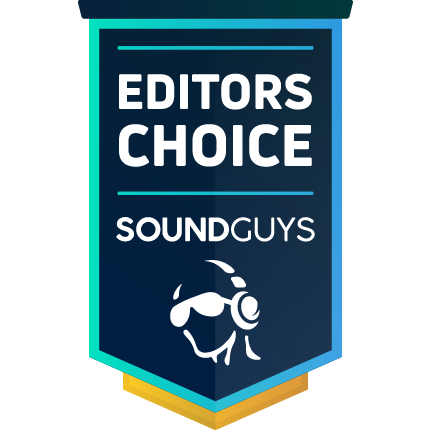
The Novation Launchkey 61 MK4 stands out as the best overall MIDI keyboard for musicians thanks to its intuitive layout, powerful features, and suitability for both beginners and professionals. In my testing, the 61 semi-weighted keys made a huge difference compared to the smaller Launchkey Mini. I could comfortably play full chords and melodies without feeling cramped, and the ability to split the keyboard into two MIDI channels allowed for creative workflows like playing bass with one hand and leads with the other.
The built-in Chord Map mode makes it easy to generate progressions without music theory knowledge, which is especially useful for bedroom producers looking to build songs quickly. Plus, the inclusion of production software like Ableton Live Lite and Native Instruments plugins provides everything you need to get started making music.
If you’re hoping for an 88-key version with all the MK4 upgrades, you’re out of luck for now—the Launchkey 88 is still stuck on the MK3 generation. If you’re okay with sacrificing a few octaves in the name of portability, though, this is a perfect MIDI keyboard for bedroom studio setups. With tactile pitch and modulation wheels, a sturdy but sleek design, and workflow-focused enhancements like fader buttons and a refined pad-based sequencer, the Launchkey 61 MK4 cements itself as the top pick for producers wanting a versatile, DAW-integrated keyboard that doesn’t overwhelm or underdeliver.
Read our full Novation Launchkey 61 MK4 review
Best portable MIDI keyboard: AKAI Professional MPK Mini MK3


Tthe AKAI Professional MPK Mini MK3 has quickly earned a reputation as one of the best portable MIDI keyboards you can buy. This is largely thanks to its affordable price tag, small form factor, and pleasing recording features. Whether you are tracking at home or in the studio, the MPK Mini MK3 is proficient at laying down beats and melodies.
The MPK Mini MK3 makes composition a breeze thanks to its 25 velocity-sensitive keys and eight assignable finger-drumming pads. I find the keyboard feels pleasant to the touch and is more evenly weighted than its predecessor. Unlike other budget keyboards, the MPK Mini MK3 makes a definitive “thump” sound instead of the all-too-common “squeak”. The controller’s Bank A/B button allows you to assign 16 unique samples to the drum pads. This is handy when writing a song with lots of percussion parts or droning synth lines. AKAI also upgraded the eight onboard knobs with taller, more premium endless rotaries. This lets you dial effects 360 degrees in either direction when hooked up to your DAW or external hardware.
Unlike most MIDI keyboards in its price range, the AKAI MPK Mini MK3 has a small OLED screen. This displays pad velocity, knob parameters, and built-in MIDI layouts in real time. The keyboard can record interesting quantized drum rhythms with the Note Repeat button and onboard note divisions. There is also a pleasing arpeggiator with adjustable parameters including tempo, sequences, swing, and octaves. When recording to a particular tempo in your DAW, you can use the Tap Tempo button to match the speed of the arpeggiator with your music. The Octave Up/Down buttons are also easily accessible for recording a wide range of notes on the fly.
The best MIDI keyboard is not without its faults, though. Firstly, those accustomed to standard keyboard sizes may find AKAI’s mini keyboard too small to play fluidly. Similarly, the controller owns an X-Y joystick instead of dedicated pitch/mod wheels or touch-based strips. It also lacks transport controls, which makes it less suited for live performance than other MIDI keyboards on this list. Those with lots of external hardware may also be disappointed by the lack of analog and digital I/O ports. Nevertheless, few will find a MIDI controller that can do as much for as little as the AKAI Professional MPK Mini MK3.
Read our full AKAI Professional MPK Mini MK3 review
Best for analog gear: Akai MPK Mini Plus


If you’re working with analog gear, the Akai MPK Mini Plus is one of the best compact MIDI keyboards you can get. Unlike most budget MIDI controllers, it includes both 5-pin MIDI DIN ports and CV/Gate outputs, making it ideal for connecting directly to modular synthesizers and analog hardware. This hardware compatibility is complemented by its built-in step sequencer and arpeggiator, allowing you to create and manipulate patterns entirely outside a DAW. In practice, I found this setup incredibly useful for syncing with older gear in my studio without needing a computer. These features give it a rare versatility at this price point, letting it integrate easily into both traditional and modern setups.
Even though it lacks full-size keys and USB-C connectivity, the MPK Mini Plus still offers tremendous value for analog users. I liked how the compact 37-key format still gives enough space to compose full musical ideas without compromising portability. With Akai’s Scale and Chord modes, you can stay in key even when experimenting with hardware synths. While the user interface requires a bit of manual diving, the flexible I/O and hands-on controls make it a great centerpiece for hybrid or fully analog production workflows. If you’re serious about hardware and want a MIDI keyboard that won’t box you into a software-only setup, the MPK Mini Plus delivers in spades.
Read our full Akai MPK Mini Plus review
Best for beginners: Novation LaunchKey Mini 37 MK4

The Novation Launchkey Mini 37 MK4 is one of the best MIDI keyboards for beginners, thanks to its seamless DAW integration and beginner-friendly features. It works effortlessly with Ableton Live, Logic, FL Studio, and more, offering deep control without manual mapping. The standout addition is the OLED display, which helps navigate settings, troubleshoot issues, and even teaches music theory with Chord Detector mode. Chord Map mode makes composing easy by suggesting harmonically compatible chords, while Scale Mode ensures you never hit a wrong note. Whether you’re learning or producing, this keyboard makes music creation more intuitive.
That said, it’s not perfect. The small, unweighted keys won’t satisfy trained pianists, and there’s a learning curve to mastering all its features, especially with Ableton. While the user manual helps, a more comprehensive video walkthrough would be ideal. Still, for beginner producers looking for an accessible, feature-packed MIDI controller, the Launchkey Mini 37 MK4 is a fantastic option that simplifies music creation and theory while keeping things fun.
Read our full Novation Launchkey Mini 37 MK4 review
Best full-size keyboard: Native Instruments Komplete Kontrol S88 MK3

Pianists and synth players looking for a MIDI keyboard that feels like the real deal should consider the Native Instruments Komplete Kontrol S88 MK3. This controller begets 88 full-size, weighted, and velocity-sensitive keys with hammer-action polyphonic aftertouch functionality. Like its predecessor, the S88 MK3 adorns an exceptionally pleasing and precise Fatar keybed. However, NI’s latest model has ditched two screens in favor of one larger, high-resolution, full-color screen.
The S88 can pre-map controls for NI’s Komplete instruments production suite or any third-party plugins that support the Native Kontrol Standard (NKS.) The controller works seamlessly with any DAW and benefits from improved integration with NI’s Maschine beat-making software. The eight knobs, 4D encoder, versatile soft switches, and large OLED screen make it easy to adjust parameters on the fly. You can also navigate and mix your project directly from the hardware. The Light Guide that runs along the top of the keys identifies key switches, scales, sounds, and drum cells to improve your workflow.
Rather than touch-based strips or the X-Y thumbstick of the AKAI MPK Mini MK3, the S88 owns dedicated pitch and modulation wheels. These come with a deeply customizable suite of assignable options including pitch, cutoff, vibrato, and virtually any other parameter you can think of. The controller also owns an additional touch strip that can be used for extra expression, control elements, and accessing preset parameters. The exterior comprises sturdy anodized aluminum and features a 4-way push encoder for one-handed library browsing and project navigation.
Fans will be pleased with the future-proof USB-C MIDI-DAW connectivity, 5-pin MIDI I/O, and four 1/4-inch TRS jack ports for sustain, expression, and supplementary controls or expression. The controller also utilizes tag-based browsing to find the sounds you want quickly. The keyboard supports easy chord triggering and scale key mapping, and the sizable transport controls provide full access to your DAW’s playback and recording controls. The only snag is that the controller is too large and heavy to transport easily.
The best MIDI keyboards: Notable mentions
- Korg microKEY2 Air-25 ($107.12 at Amazon): If you seeking a no-frills budget MIDI keyboard that is simply plug and play, the Korg microKEY Air 25-Key is a good option.
- M-Audio Oxygen Pro Mini ($119 at Amazon): This portable keyboard still offers a lot of input flexibility, including performance pads, knobs, buttons, wheels, and programmable faders.
- Arturia MiniLab 3 ($109 at Amazon): Adorning virtually the same footprint and aesthetic as its predecessor, the Arturia MiniLab 3 owns eight endless rotaries, eight velocity- and pressure-sensitive RGB backlit pads, and four pleasing sliders. There is also a USB-C port, a 5-pin MIDI-out, and a 1/4-inch pedal port on the back panel. The controller integrates seamlessly with Analog Lab and supports the Mackie Control protocol with other DAWs.
- M-Audio Keystation 49 MK3 ($119 at Amazon): This controller owns velocity-sensitive full-size keys and dedicated pitch and modulation wheels. The sensible transport controls and volume slider are handy for live performances, while the latter can also control MIDI values in your DAW. The keyboard connects via USB and includes Ableton Live Lite and MPC Beats.
- Novation FLkey Mini ($109.99 at Amazon): If you use FL Studio and need a MIDI keyboard you can take on the go, grab the FLkey Mini. This 25-key controller owns 16 velocity-sensitive backlit pads, eight customizable knobs, and pitch and modulation touch strips. The keyboard connects via USB and begets a 1/8-inch jack on the back panel for hooking up to external hardware. Unfortunately, the adapter is sold separately.
- Roland A-88 MKII ($1266.99 at Amazon): The Roland A-88 MKII features some smart upgrades including MIDI 2.0, three pad modes, and six velocity curve presets. The keyboard can operate in up to three layers or split zones and uses a combination lever for adjusting pitch and modulation. Its 88 keys have a pleasing ivory finish with a 3-sensor detection and escapement that closely replicates a genuine piano feel when keys are half-pressed.
- Arturia KeyStep 37 ($199 at Amazon): Although a mid-tier offering, the KeyStep 37 offers the same comprehensive list of I/O ports as the original KeyStep. There is also an eight-mode arpeggiator and a polyphonic sequencer. The keyboard has a pleasing chord mode that is easy to use with the LED screen and three dedicated rotary knobs. Its standalone Chord Strum feature spaces the notes in a chord to emulate a guitar-like picking, which is handy.
- Roland A-49 ($309.99 at Amazon): The Roland A-49 has a pleasing velocity-sensitive keyboard. There are also sustain and expression pedal inputs, octave and transpose buttons, a bend/modulation lever, and Roland’s proprietary D-BEAM controller. The last is an infra-red gesture controller to adjust arpeggios, chords, single notes, or MIDI CC messages. The A-49 is also effective for directly controlling SuperNATURAL synths.
- Arturia KeyLab 49 MkII ($289.99 at Amazon): Bundled with Analog Lab 3, the KeyLab 49 MkII delivers easy DAW transport, command, and parameter entries. The keyboard also enjoys aftertouch functionality and the metal pitch and modulation wheels are pleasing. The controller also begets many I/O ports including five pedal connectors, MIDI-in and out, and five CV connectors with pitch, gate, mod 1 and mod 2, and input.
- Nektar Impact LX88+ ($319.99 at Amazon): Those looking for an affordable 88-key MIDI controller should consider the Nektar Impact LX88+. This keyboard owns extensive DAW controls and houses eight rotary knobs, nine sliders, eight pads, nine buttons, and dedicated transport controls. The Mixer and Instrument tactile buttons control settings like level, pan, mute, solo, and VI parameters such as filters and envelopes.
- Kawai VPC1 Virtual Piano Controller ($2599 at Amazon): Minimalists and piano purists wanting a playability-focused MIDI controller should get the Kawai VPC1. With MIDI-in, out, and USB ports, the VPC1 focuses purely on build quality, action, and velocity curves. Kawai has created a genuine and pleasing piano feel with real wooden keys and ivory-style key surfaces. There is also a triple-pedal array and four excellent software pianos.
- Nektar Panorama P4 ($499.99 at Amazon): Those invested in the Reason workflow should grab the Nektar Panorama P4. This four-octave keyboard features a backlit LCD color screen and a list of encoders, faders, and MPC-style drum pads. There are also three Reason modes — Mixer, Instrument, and Transport. These are used to navigate channels, control functions, external instruments assigned to sequence tracks, pre-roll, tempo, and more.
- Arturia KeyLab MkIII ($219 at Amazon): While not the cheapest, the Arturia KeyLab MkIII has an excellent keyboard with semi-weighted keys and monophonic aftertouch. There are also 12 velocity-sensitive pads with four banks, expanding the amount of individual playable pad samples to 48. The controller integrates seamlessly with Analog Lab and owns desirable features like arpeggiator randomization, scale mode, and transport controls.
- Roli Seaboard Rise 49 ($1199.99 at Manufacturer site): The upgraded sibling to the Rise 25, the Rise 49 brings a rechargeable battery, wireless connectivity, and the “Noise” companion app (iOS only.) The keyboard style takes some learning, but the ability to slide seamlessly from a white to a black key is a standout feature. Sound shaping is second to none, and the keyboard’s assignable X-Y touchpad makes it easy to control parameters.
- Novation Impulse ($399.99 at Amazon): This reasonably-priced controller awards a pleasing velocity- and aftertouch‑sensitive semi-weighted keyboard. The LCD screen makes it a breeze to adjust parameters on the fly, and the eight backlight finger-drumming pads work with the Roll button to generate repeated note triggers. The Impulse begets four velocity curves and is compatible with Novation’s Automap system.
- Nektar SE49 ($89.99 at Amazon): The SE49 owns full-sized velocity-sensitive keys, four velocity curves, and a MIDI-assignable fader. There are also dedicated pitch and modulation wheels, octave up/ down, and transposition buttons. Most handily, the MIDI fader, modulation wheel, and footswitch pedal can control any MIDI CC message, profiting a truly personalized workflow. These settings are stored even when you power off.
- AKAI Professional MPK249 ($469 at Amazon): This impressive controller owns 16 backlit RGB pads with four banks, profiting 64 assignable pad destinations. It also has a 10-octave range with the relevant octave up/down buttons and 49 semi-weighted keys with aftertouch. There are also 24 assignable knobs and faders and a backlit LCD screen. Handily, the keyboard ships with Ableton Live Lite, MPC Essentials, and a list of virtual synths.
- Native Instruments Komplete Kontrol A25 ($169 at Amazon): The A25 is an excellent, compact, and affordable introduction to the Komplete ecosystem. This bus-powered controller owns eight rotary knobs, substantial pitch and modulation wheels, and a small OLED screen for text-only feedback. The A25 works seamlessly with the Komple Kontrol and Maschine software. The 4D encoder makes browsing NKS instruments a breeze.
What you should know about the best MIDI keyboards
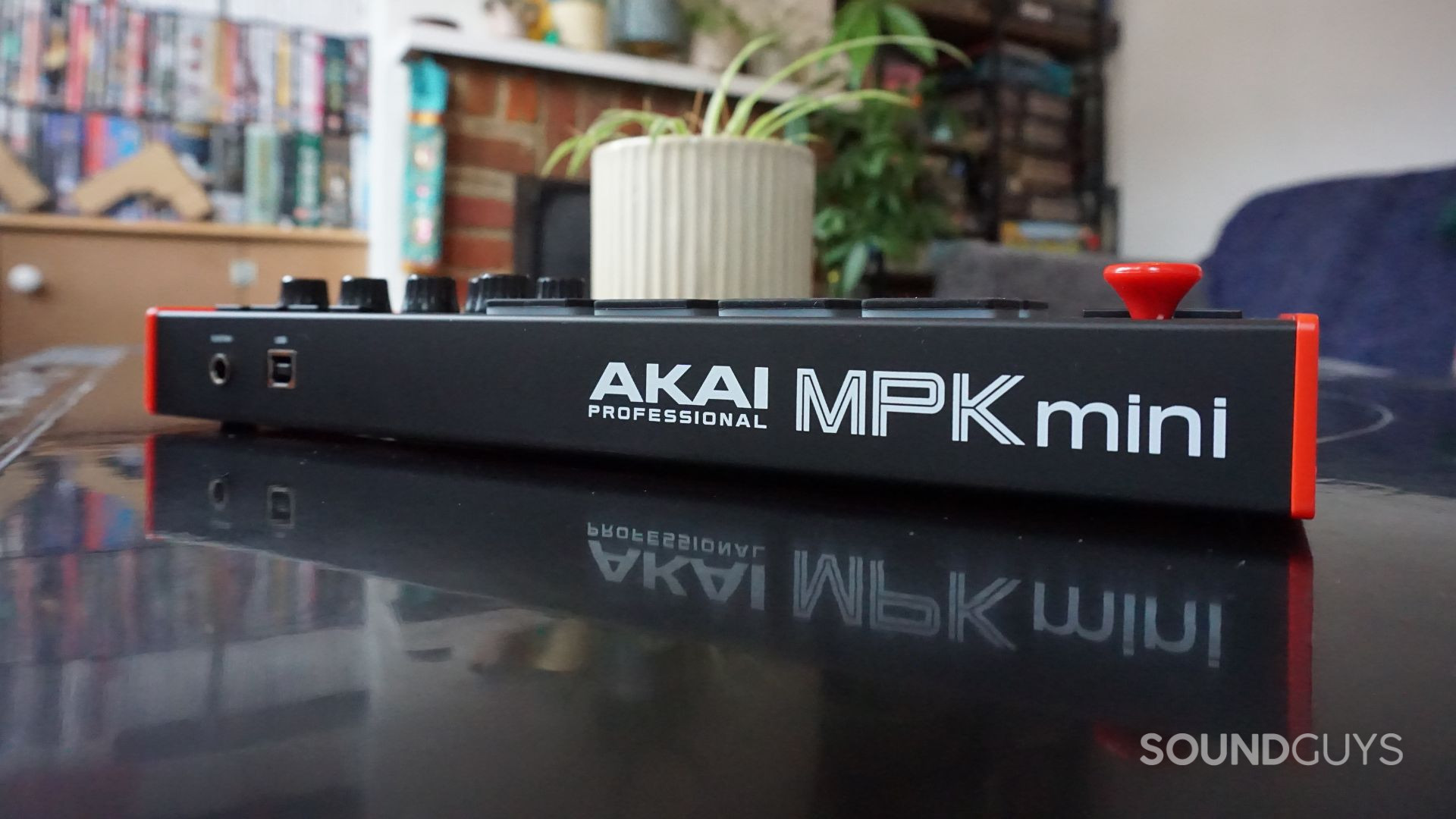
What constitutes “the best” MIDI keyboard depends on many things including available workspace, your chosen DAW, and your desired workflow. This list aims to help musicians and producers with different wants, but our picks may not meet your needs. As such, SoundGuys always recommends you consider what is personally important before purchasing. Our list features many industry-leading MIDI keyboard manufacturers and long-time favorites. Nevertheless, it’s always worth reading our other lists and feature articles to make an informed decision.
One of the most important purchasing factors for many boils down to price. However, there are other considerations to weigh up including the number of keys, action, and key size. Those with lots of external hardware may need a controller with comprehensive analog and digital I/O ports. Similarly, you may want a MIDI controller that includes recording software out of the box.
How many keys?
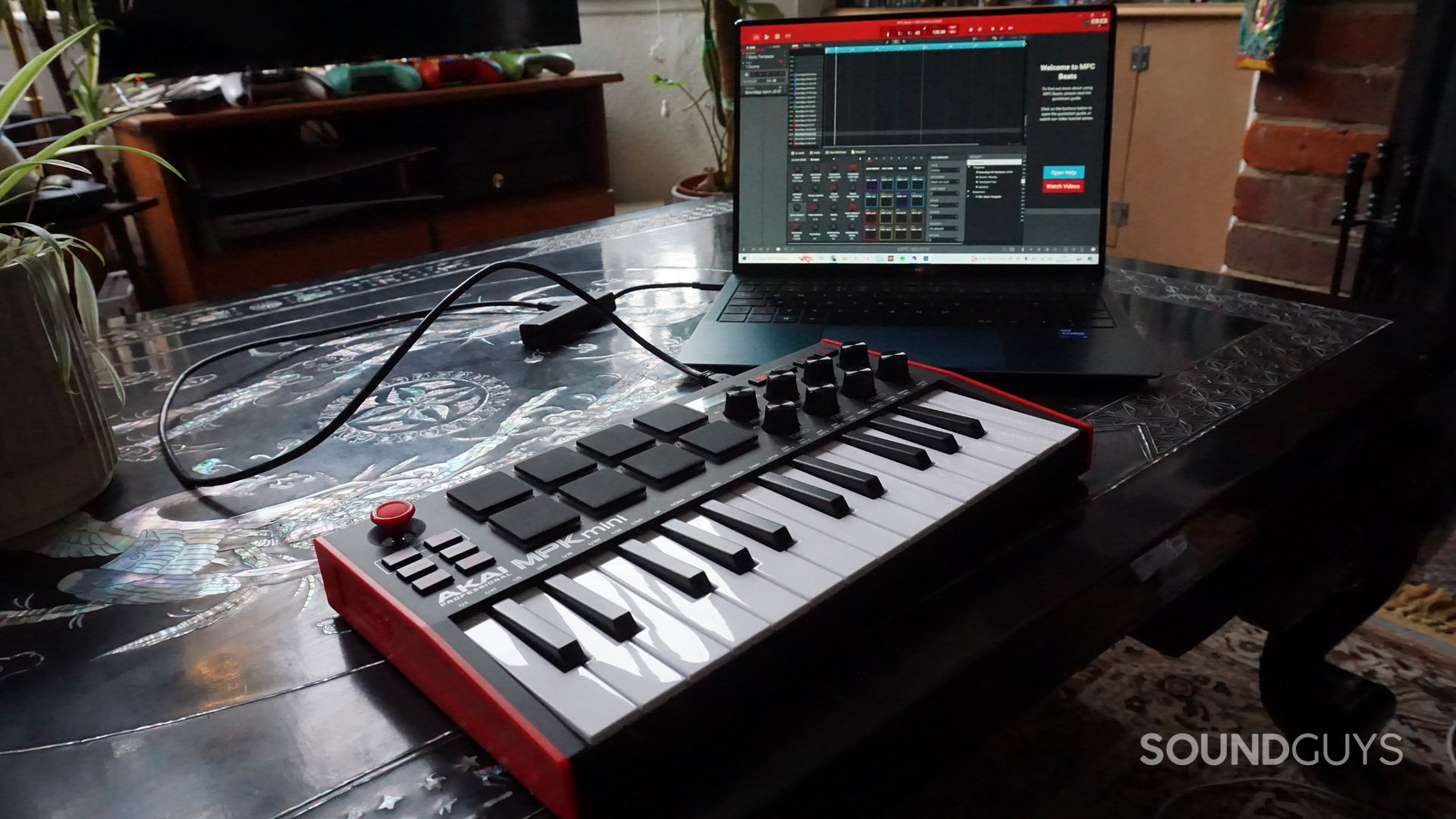
MIDI keyboards come in all shapes and sizes but are most commonly manufactured with 25, 37, 49, 61, or 88 keys. Whatever size you choose has pros and cons, including playability, portability, layouts, and I/O ports. Larger controllers tend to cost more, while mini keyboards attract a cheaper price tag.
If you intend to take your MIDI keyboard out and about and often compose melodies within a relatively limited melodic range, then 25 keys may be best for you. Of course, most mini MIDI controllers have an octave up/down button for recording a broader range of notes. However, this process is more timely and less intuitive than recording in real-time with a larger keyboard. Most 25-key controllers also adorn miniature key sizes. While these vary in size, they are usually substantially shorter and narrower than industry-standard full-size keys. This ultimately hinders pianists and synth players accustomed to regular-sized keyboards. Mini controllers also sacrifice comprehensive I/O ports, knobs, rotaries, and larger displays for a smaller, more lightweight form factor.
49-note keyboards award the best size-to-playability ratio for most people.
On the other hand, 88-key controllers usually own full-size keys and a longer list of knobs, dials, drum pads, and I/O ports. Many adorn large OLED screens that navigate the controller’s comprehensive digital feature set. With over seven octaves to play, 88-key MIDI controllers are excellent for recording piano arrangments and large ensembles. Larger keyboards are also better for splitting into separate zones for recording bass, chords, and leads. The additional space allows for dedicated pitch and modulation wheels instead of touch-based strips or X-Y joysticks. These are generally more desirable because of their pleasing feel, accuracy, and ease of use. However, 88-key controllers are large, heavy, and much less portable than smaller keyboards.
Those wanting the best size-to-playability ratio should consider 49-key controllers. These serve as a happy middle ground between 25- and 88-note keyboards and award a four-octave note range. Consequently, fans can compose wide-ranging piano parts without feeling limited. Some 49-key controllers, like the Novation 49 SL MkIII, adorn a full-size keybed and dedicated pitch and modulation wheels. Many also host 16 drum pads, which are easier to use than eight pads with bank A/B. Live players usually benefit from more comprehensive transport controls and analog outputs for connecting to external hardware. Unfortunately, those with limited studio space may find that 49-note keyboards are too bulky.
What is keyboard action?
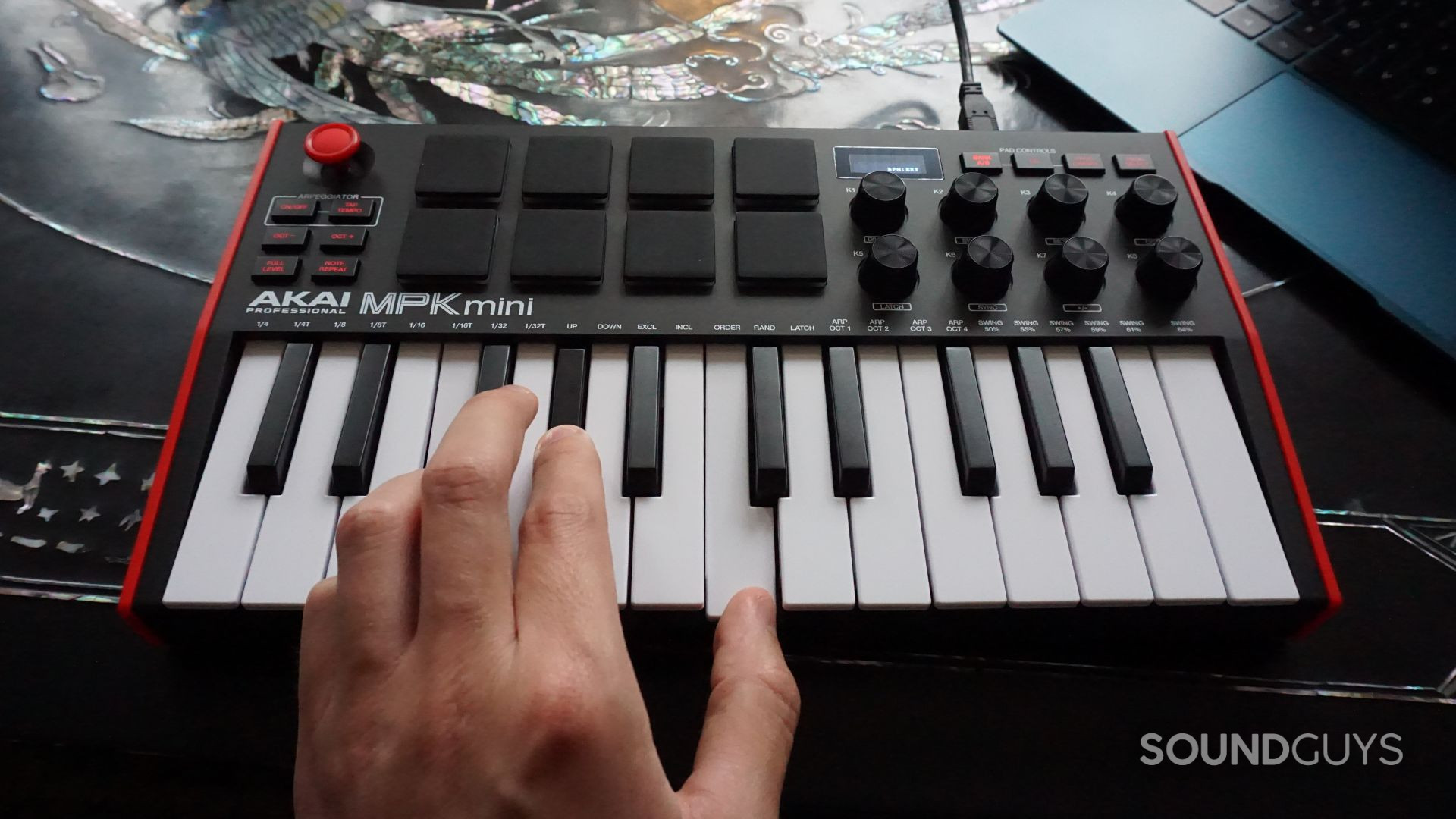
As well as keyboard size, it is worth considering the type of keyboard action you want. The materials, mechanisms, keybed design, and overall expression profoundly affect how one instrument plays against another. A “successful” keyboard design may also showcase realistic velocity and escapement functionality. Simply put, this emulates the interval of a piano’s hammer striking a string and returning to its resting position. The duration and rate change depending on how long and often you press a key.
There are three main types of keyboard action: synth-action, semi-weighted, and fully-weighted keys. The first typically utilizes a spring-loaded design that, as the name suggests, is often found on synthesizers and MIDI controllers. This allows each key to feel virtually the same and is almost entirely void of escapement. Moreover, the lightweight build of synth-action keys provides more uniform playing up and down the keybed. Synthesizers and MIDI controllers ditch authentic piano feel for virtually limitless sound creation tools. As such, expression originates mostly from real-time parameter adjustments, modulation, and pitch shifting. Synth-action keys are the ideal choice for digital sound creation enthusiasts and efficient playing.
Most MIDI keyboards house synth-action keys thanks to their uniform feel and efficient playability.
Like synth-action keys, semi-weighted keys use a spring-loaded system with small, integrated weights. While the physical resistance is mild compared to fully-weighted keys, the level of pushback feels more familiar than synth-action keys. In particular, semi-weighted keys enjoy an escapement profile that depresses quickly and rises slowly. This feels more natural than a purely spring-loaded mechanism but makes certain piano techniques, rapid successions, and repetitions less easy to execute. However, semi-weighted keys are better than synth-action keys for pianists entering the digital instrument arena for the first time.
Fully-weight keys use either hammer action or progressive hammer action systems. The former utilizes genuine hammers and integrated sensors to detect the weight of the falling hammer once the key is released. This faithfully and uniformly emulates the feeling of real piano keys. However, progressive hammer action ensures that the weight of the keys mimics the feel of a real piano relative to their position along the keybed. In practice, the key weights decrease as you move up the keybed. While this feels the most authentic out of all the keyboard action types, it is more physically limiting.
How we test the best MIDI keyboards
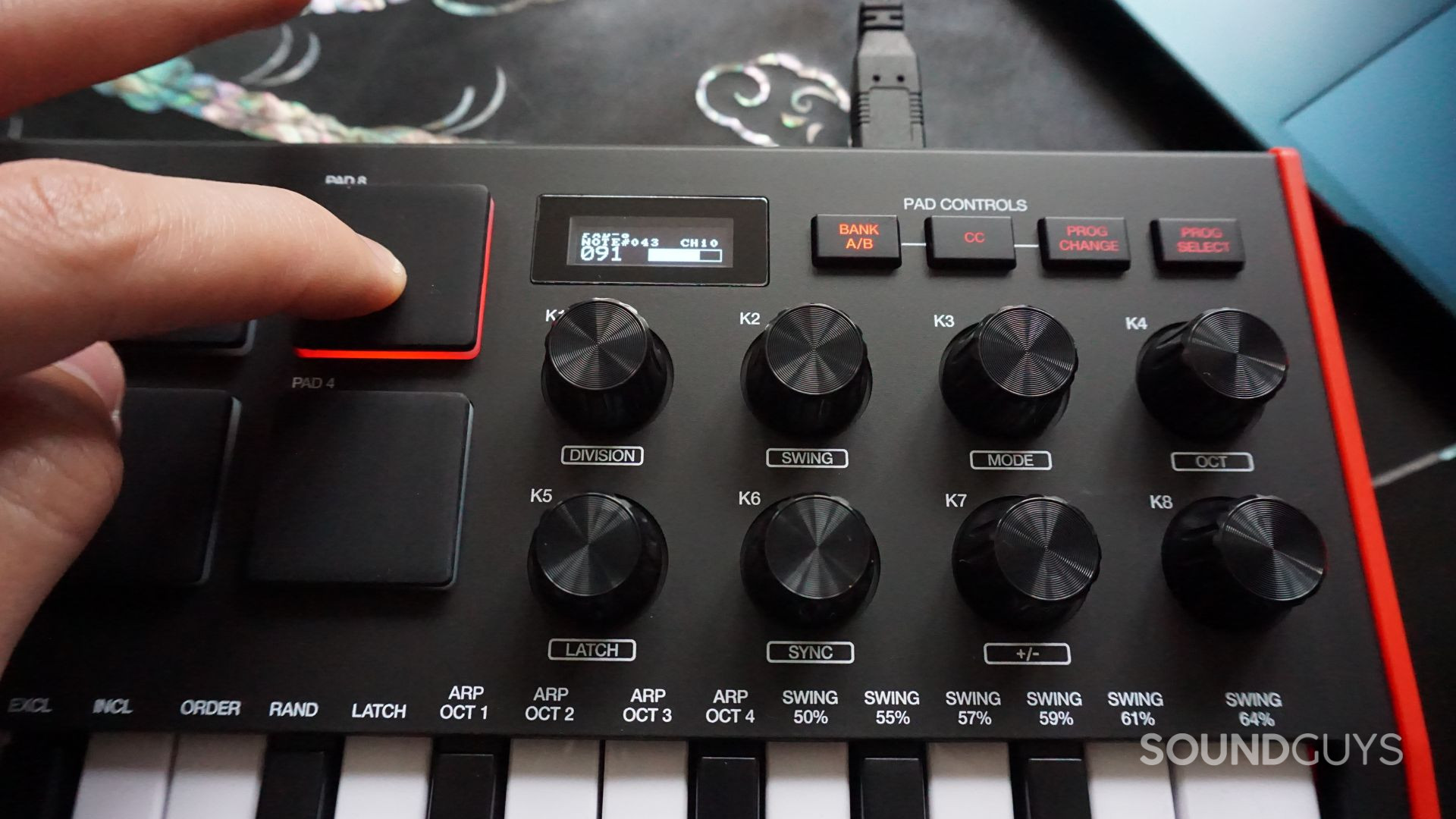
Here at SoundGuys, we stay on top of industry trends and rigorously test each product in real-world situations to obtain all the information on how they work. Our team of professionals spends days getting to grips with the ins and outs of each product to provide user-focused feedback. Our team comprises musicians who understand the needs and wants of keyboardists and producers.
From studying a product’s connectivity options to testing its feel and response, we aim to provide honest feedback in our reviews. We believe our years of experience, hands-on reviews, and accumulation of scientific measurements lend us authority in choosing some of the best MIDI keyboards in 2025.
How we choose the best MIDI keyboards
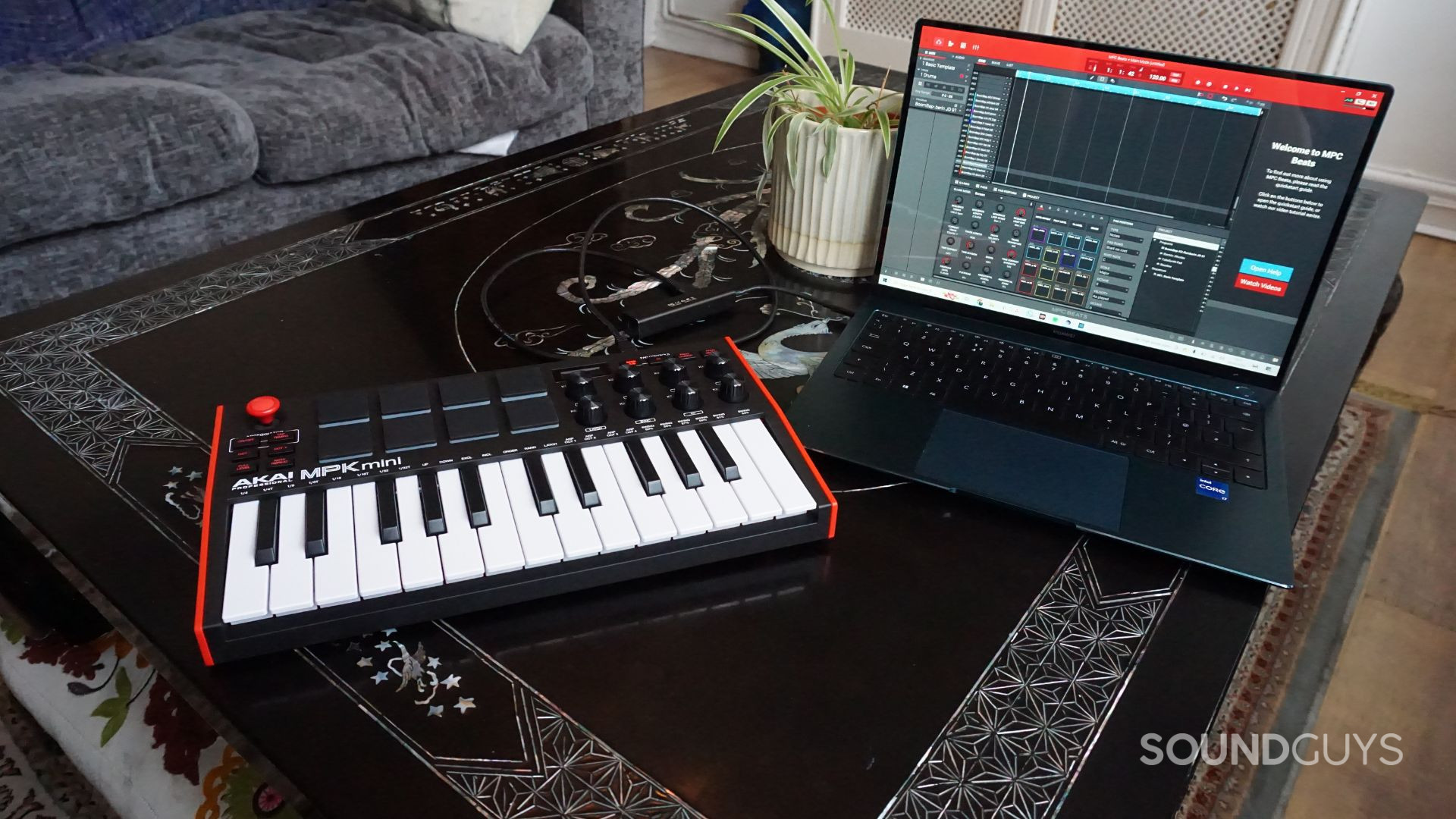
Like virtually all consumer electronic device categories, the MIDI keyboard market is extremely diverse. Subsequently, we have taken the time to consider how musicians and producers use MIDI keyboards and which features are most important. While we have listed a variety of mini, standard, and full-size controllers, it is worth acquainting yourself with the descriptions to ensure they are right for you. Very few MIDI keyboards are without trade-offs, so consider which features are individually desirable and which you are willing to live without.
Our MIDI keyboard best list is by no means comprehensive. However, we must strike a balance for our readers and promote the best price-to-performance ratio. As such, listing purely ultra-expensive MIDI keyboards would not suit most musicians and producers. Additionally, many cheaper controllers profit flagship features nowadays that compete with older, more established brands. Cheaper MIDI keyboards are usually smaller and more suitable for tight studio spaces and touring musicians. Conversely, full-size controllers are better for piano purists and those wanting a more authentic piano feel. Given the subjective nature of MIDI keyboard wishlists, not every product listed here will meet your needs.
Why you should trust SoundGuys
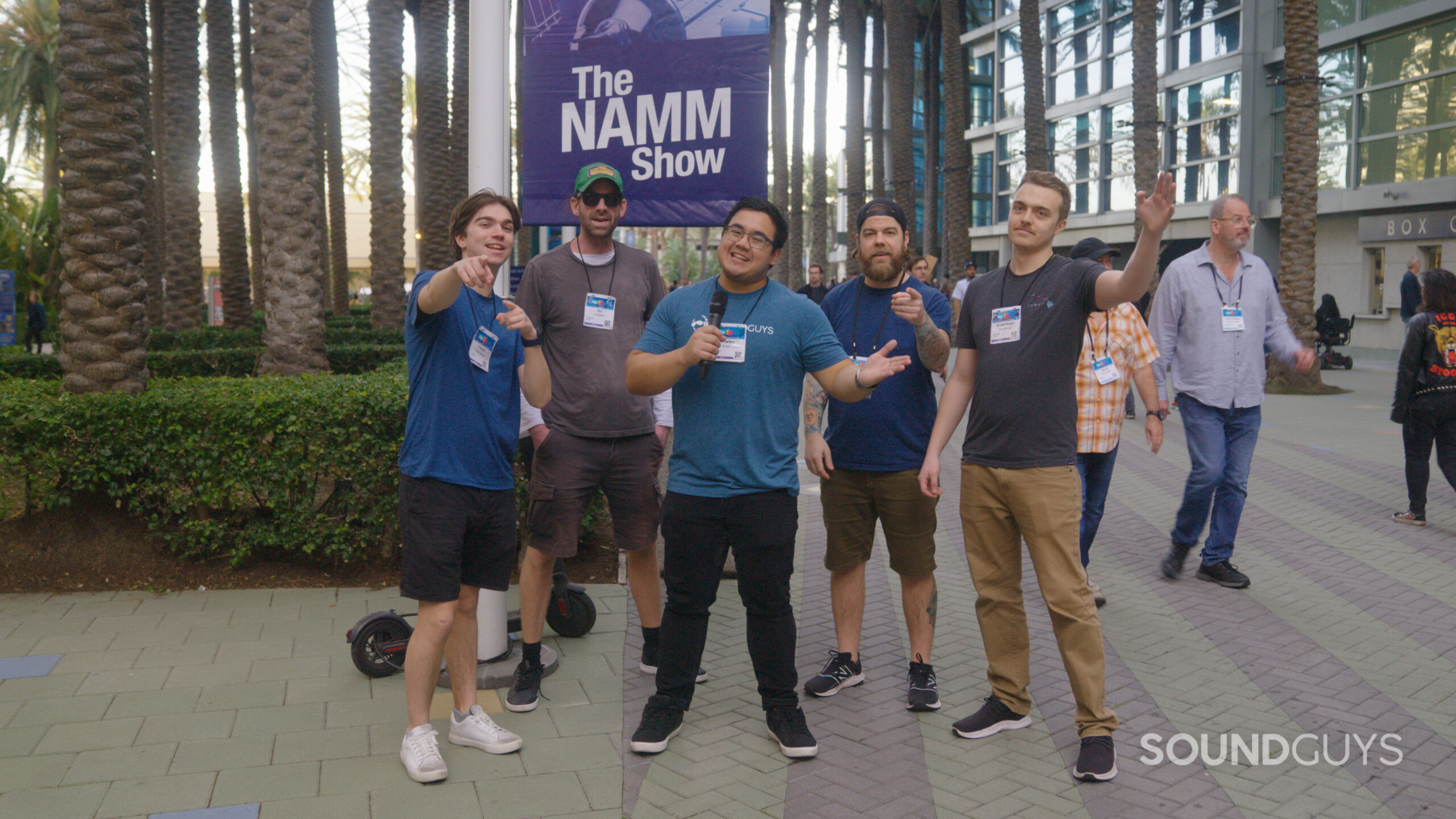
You can trust us because we take pride in providing unimpeachable information and showing our homework. Our revenue model is also based on the happiness of our readers with our recommendations — we don’t make money when you return a product we recommend.
The SoundGuys team has years of experience testing and reviewing products between them. We only recommend products that have genuinely impressed us and will benefit our audience. Our best MIDI keyboards list is curated with the consumer in mind. We strive to strike a balance between cost, features, and performance.
Frequently asked questions
This is subjective and depends on your personal needs. However, AKAI is often considered to make some of the most pleasing and cost-effective MIDI keyboards on the market.
The Native Instruments Komplete Kontrol S88 MK3 is our top-pick MIDI keyboard for those looking for an authentic piano feel. This is thanks to the controller’s 88 full-size, weighted, and velocity-sensitive keys with hammer-action polyphonic aftertouch and Fatar keybed.
This depends on what you want to play and how much available space you have. Ultimately, 88-key MIDI controllers offer the widest note range for recording the broadest musical compositions. However, they often require lots of space and are too heavy to carry out of the house.
Many professional artists use different MIDI controllers based on their personal needs. For example, M-Audio’s Oxygen series is used by Pharrell Williams, while many producers swear by the Arturia KeyStep Pro. Ultimately, you should choose a MIDI controller based on your desired feel, workflow, and available space.
Thank you for being part of our community. Read our Comment Policy before posting.